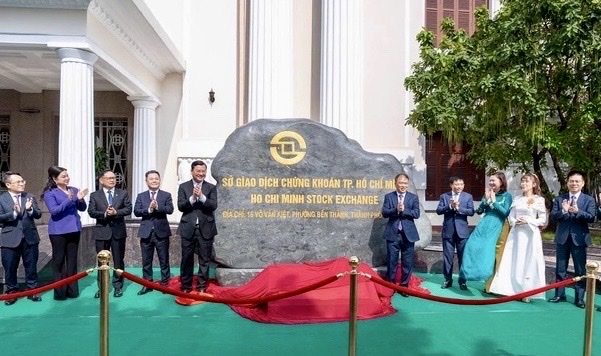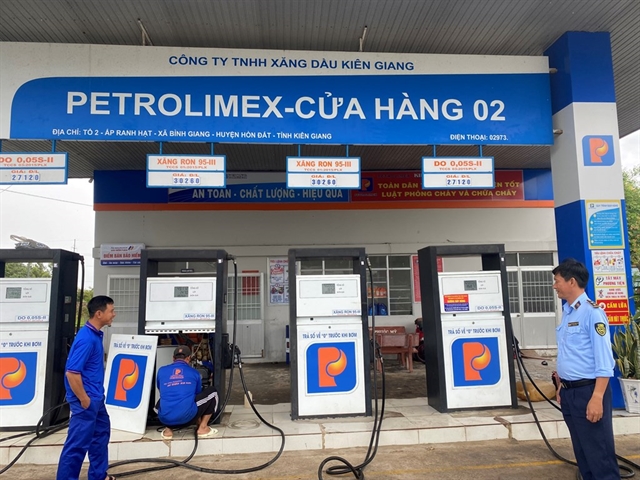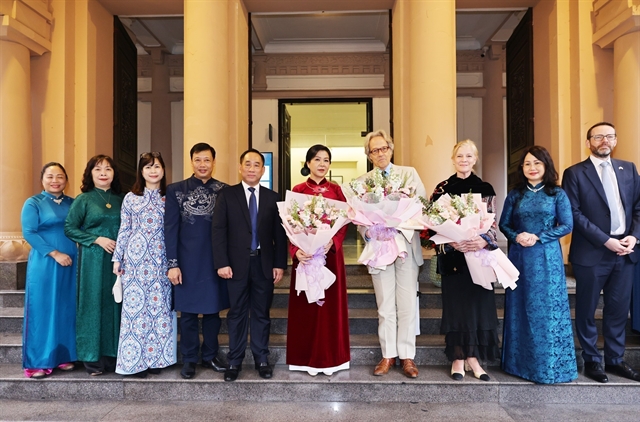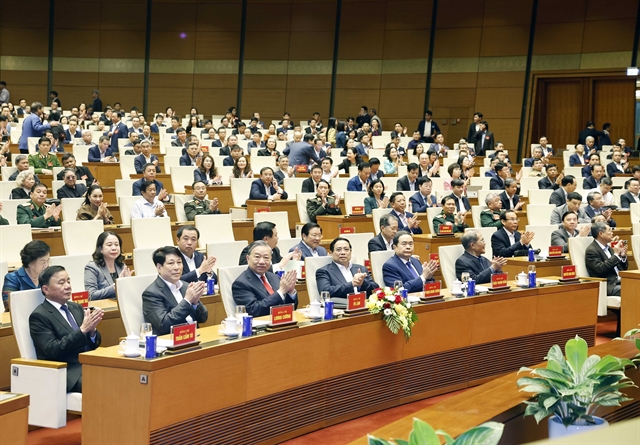 Economy
Economy


|
| The market surveillance force in the southern province of Kiên Giang inspects a gas station. VNA/VNS Photo Uyên Hương |
HÀ NỘI — The Ministry of Industry and Trade (MoIT) has ordered market surveillance forces to inspect petrol stations that have suspended operations and strictly deal with violations.
Minister of Industry and Trade Nguyễn Hồng Diên on Saturday signed a directive to enhance inspection and handling of violations in petrol trading. According to the order, inspection teams will have to determine the reasons for the suspension of gas stations, and propose measures against those infringing fuel trading rules.
In addition, the market surveillance force requires businesses and petrol and gas stations to operate according to the content of the certificate of eligibility for petrol and oil trading that has been granted, ensuring the supply of petroleum supply in their area.
The minister requested that the head of the market surveillance force take full responsibility for directing and organising the work of supervision, inspection, and strictly handle cadres and civil servants with loose management, covering up and abetting violations in the petroleum business.
During the question session on Saturday morning at the fourth session of the 15th National Assembly, Diên said that the supply is increasingly scarce as Europe increases the purchase of petroleum products. The exchange rate of the strong currency to import gasoline has increased, making it difficult for importers. Access to foreign currency to ensure payment and distribution also faces difficulties because many enterprises do not meet the conditions for loans and bank guarantees.
Many residents in big cities such as Hà Nội, HCM City and the Mekong Delta have had difficulties buying gasoline as stations were shut, affecting daily life and business operations. One reason for the suspension was they were suffering losses from price differences.
In compliance with the Prime Minister’s Official Dispatch 1039/CD-TTg issued on November 2, the ministry has ordered the market surveillance agencies nationwide to keep inspecting fuel trading operations, tackling violations and coordinating with the local departments of industry and trade to monitor the fuel trading systems.
The Ministry of Finance on the same day consulted on adjusting the cost of importing gasoline to Việt Nam, and receiving support from MoIT. It is expected there will be an appropriate adjustment on November 11.
According to the minister, domestic petroleum production meets about 80 per cent of demand, but more than half of crude oil still has to be imported. More than 20 per cent of finished petroleum products must be imported from abroad, so the fuel supply is still affected.
Domestic petroleum production and imports have reached 86 per cent of the plan so far, causing a shortage of about 18,000-19,000 cu.m. The ministry has coordinated with other ministries and agencies to increase the average annual output by 20 per cent, which will be enough to meet demand.
The MoIT would propose to half the gap between gasoline price adjustments from 10 to five days to address price fluctuations.
Currently, Vietnamese authorities typically adjust fuel retail prices every 10 days, based on the average prices of the previous 10 days.
However, many National Assembly delegates said the cycle is no longer suitable as it leaves domestic prices 20 days outdated compared to global prices, which are unstable.
He said the ministry would submit a proposal to the Government to shorten the gap between gasoline price adjustments to five days or even daily if it receives support from the public.
Responding to the idea that the MoIT has issued licenses freely, with a total of 36 key fuel distributors, the minister said that the opinion of the ministry was not to grant more licenses. It is necessary to rearrange the system, from focal points to agents and retailers, to reduce the hierarchy.
In Việt Nam, there are 36 suppliers who either import gasoline from other countries or source from the two domestic refineries Dung Quất and Nghi Sơn, 500 distributors, and 17,000 gas stations.
Prime Minister Phạm Minh Chính, at the National Assembly’s Q&A session on Saturday, instructed these ministries and agencies to quickly solve shortcomings and ensure sufficient fuel supply for daily life and production under any circumstances. VNS




